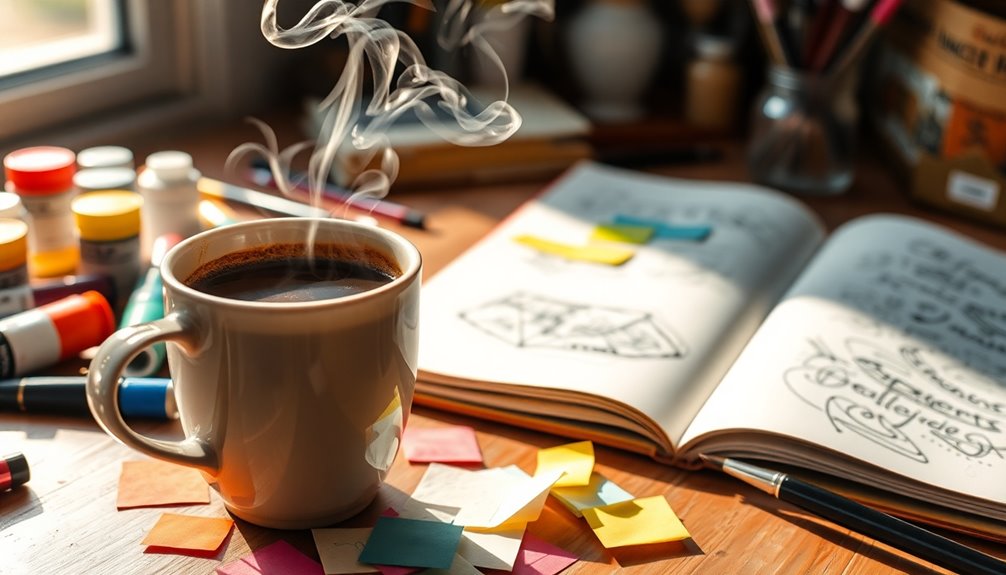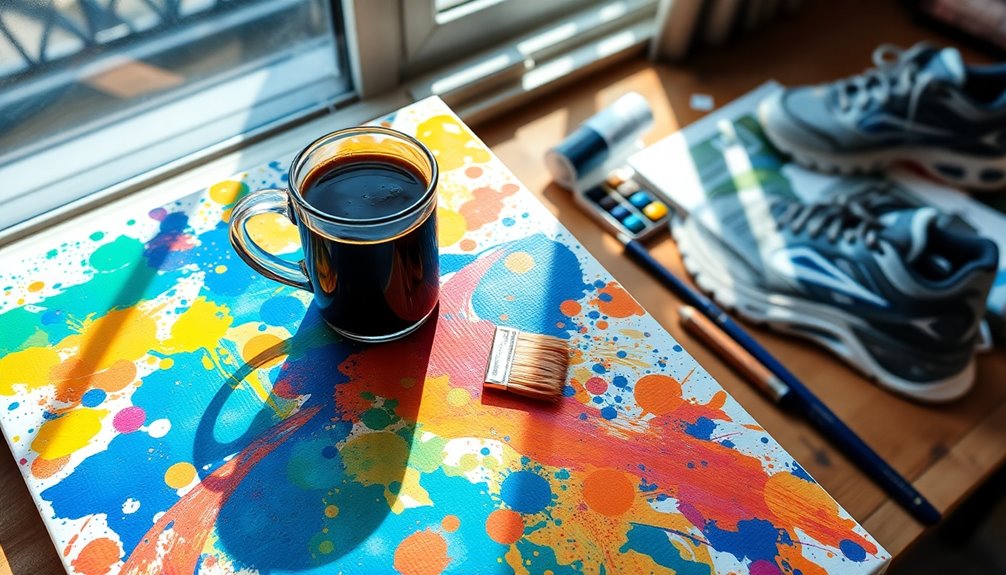Caffeine can markedly enhance your artistic and problem-solving skills. When you sip coffee, it stimulates your central nervous system, improving focus and boosting dopamine levels. This leads to better cognitive flexibility, allowing you to tackle complex tasks and generate fresh ideas. Plus, caffeine elevates your mood, fostering a creative mindset. Surroundings also play a role—think of the cozy ambiance of a coffee shop that sparks inspiration. Just remember to balance your intake to avoid jitters. Curious about how you can optimize your caffeine consumption for creativity? There's more to uncover about harnessing its full potential.
Key Takeaways
- Moderate caffeine intake enhances cognitive flexibility, improving problem-solving abilities and creativity in complex tasks.
- Caffeine consumption elevates mood, fostering positive emotional states that enhance performance in creative and artistic endeavors.
- Engaging with stimulating environments, like coffee shops, boosts creativity through social interaction and ambient noise.
- Regular physical activity combined with caffeine optimizes cognitive function, promoting divergent thinking and idea generation.
- Finding the right caffeine balance and timing maximizes its creative-enhancing effects while minimizing potential jitters.
Caffeine's Role in Cognitive Function

Caffeine plays an essential role in enhancing cognitive function, especially when you're tackling complex problems. By consuming moderate doses, like 200 mg, you can boost your problem-solving ability considerably.
Caffeine stimulates the central nervous system, leading to increased dopamine levels, which enhance motivation and cognitive control. This results in improved focus and alertness, vital for convergent thinking tasks.
While you might find your attention and memory recall sharpened, it's worth noting that caffeine doesn't considerably improve creative thinking. In fact, studies show that while it enhances your mood and cognitive performance, its effects are more about attention network function than divergent thinking. Additionally, staying properly hydrated can further prevent fatigue and enhance overall cognitive performance.
Enhancing Problem-Solving Abilities

If you're looking to sharpen your problem-solving skills, caffeine could be your ally.
It boosts your focus and enhances cognitive flexibility, making it easier to tackle complex tasks.
With just a moderate dose, you might find yourself coming up with quicker and more accurate solutions. Additionally, incorporating high-quality content into your research process can significantly enhance your overall cognitive performance.
Caffeine Boosts Focus
When you reach for that cup of coffee, you're not just seeking a pick-me-up; you're also giving your brain a powerful boost in focus.
Caffeine enhances your problem-solving abilities by improving attention levels and cognitive control, essential for tackling complex tasks. Studies show that moderate caffeine consumption, around 200 mg, greatly boosts performance in convergent thinking tasks compared to a placebo.
You'll likely notice increased alertness, allowing you to arrive at faster and more accurate solutions. The expectation of caffeine also lifts your mood, further enhancing your focus and creativity. Additionally, coffee's antioxidant properties can combat oxidative stress, which may contribute to improved cognitive function.
Enhances Cognitive Flexibility
Building on the focus and alertness gained from caffeine, it also plays a key role in enhancing cognitive flexibility. This flexibility is essential for adapting to new information and generating effective solutions during problem-solving tasks.
Research shows that moderate caffeine consumption (around 200 mg) greatly boosts your convergent thinking abilities, leading to faster and more accurate problem-solving. By stimulating your central nervous system, caffeine increases alertness and focus, which are crucial for tackling complex cognitive challenges.
Furthermore, caffeine enhances attention network function, improving cognitive control and facilitating better problem-solving strategies. Additionally, this enhanced cognitive function can be further supported by regular consumption of teas that are linked to improved brain health and memory retention.
The Science of Creative Thinking

When you think about creative thinking, consider how cognitive flexibility plays an essential role in generating fresh ideas. Caffeine not only boosts your mood but also enhances your ability to switch between different concepts, making it easier to connect the dots. Understanding these factors can help you tap into your creative potential more effectively. Additionally, positive thinking can further amplify your creative output by fostering an environment conducive to innovation and problem-solving.
Cognitive Flexibility Enhancement
Caffeine plays an essential role in enhancing cognitive flexibility, allowing you to navigate complex creative tasks with greater ease.
With moderate caffeine intake, you'll experience:
- Improved dopamine levels, boosting your motivation and making it easier to switch between tasks.
- Faster and more accurate problem-solving, thanks to enhanced convergent thinking that helps in finding effective solutions.
- Increased alertness and concentration, essential for tackling mental blocks and engaging in deep creative thinking. Additionally, maintaining a budget for caffeine consumption can help ensure you enjoy its benefits without experiencing negative side effects.
Mood Influence on Creativity
Creativity thrives in a positive emotional landscape, where mood plays an essential role in shaping your innovative output. Research shows that positive emotional states enhance creativity and problem-solving abilities.
When you consume caffeine, it can improve your mood, which may boost cognitive performance during brainstorming sessions. Notably, even the expectation of caffeine can elevate your mood and enhance performance, highlighting the psychological impact of mood on creativity.
Additionally, mindfulness practices have been linked to better insight problem-solving, emphasizing how your emotional states directly affect your creative cognition.
The interplay between mood and cognitive control suggests that your emotional state can modulate brain functions fundamental for creative thinking, making it important to nurture a positive mood for peak creativity. Furthermore, techniques for enhancing dream clarity can also contribute to improved creativity during waking hours by promoting a more relaxed and inspired mindset.
Mood and Its Impact on Creativity

Mood plays an essential role in shaping your creative output, as positive emotional states often lead to enhanced performance in creative tasks. When you're in a good mood, your creative thinking can flourish, boosting cognitive performance and problem-solving abilities.
Consider the following:
- A serene environment that calms your mind.
- Engaging in mindfulness practices to enhance attentional control.
- Surrounding yourself with mood-enhancing stimuli, like uplifting music or art.
These elements can help foster an atmosphere where creativity thrives. Additionally, incorporating uplifting scripture can serve as a powerful tool to elevate your mood and inspire creativity.
Caffeine's Effect on Artistic Expression

While you might be familiar with the invigorating effects of that morning cup of coffee, its influence on artistic expression extends far beyond mere wakefulness.
Caffeine enhances your cognitive processes, boosting memory and attention—both essential for creativity. When you consume caffeine, it can help alleviate creative blocks, allowing you to maintain focus and engage in complex problem-solving tasks.
The stimulating effects promote mental clarity and cognitive flexibility, helping you switch between ideas effortlessly. Additionally, caffeine positively impacts your mood, which often leads to increased creative performance.
The rituals surrounding your coffee consumption can evoke emotions and memories, enriching your creative experience and inspiring your artistic expression in ways you mightn’t even realize. Not only does the act of preparing and savoring a cup of coffee contribute to your overall well-being, but research has also shown the benefits of coffee on heart health. The antioxidants and anti-inflammatory properties in coffee can help reduce the risk of heart disease and stroke. So, next time you brew a cup of your favorite coffee, take a moment to appreciate the potential impact it can have on both your emotional and physical health.
Creative Processes and Environmental Factors

Your creative output can markedly shift based on your mood and surroundings.
Engaging with stimulating environments and sensory experiences can spark new ideas and enhance your problem-solving abilities.
Understanding how these factors influence your creativity can help you create the ideal conditions for inspiration.
Impact of Mood
When you're in a positive emotional state, your creative output often flourishes, as research shows that such moods enhance problem-solving abilities.
You might notice that:
- Caffeine lifts your mood, making you feel more energized and less sad.
- Mindfulness practices lead to calmness, sharpening your insight problem-solving skills.
- Physical activity boosts your creativity, allowing you to think outside the box.
These factors intertwine, showing that your mood greatly influences creative thinking.
When you consume caffeine, it not only elevates your spirits but also correlates with improved problem-solving skills. Additionally, incorporating essential oils for mood enhancement can further support your creative processes.
Environmental Stimulation
Environmental stimulation plays an essential role in enhancing creativity, as the right surroundings can spark your imagination and boost your innovative thinking.
Environmental factors, like the ambiance of coffee shops, create a perfect blend of moderate background noise and social interactions that enhance your cognitive flexibility. Engaging with nature further elevates your creative thinking, allowing fresh ideas to flow.
Mindfulness practices, nurtured in serene environments, can sharpen your problem-solving abilities, making you more adept at finding innovative solutions. Additionally, stimulating aromas, such as coffee, evoke emotions and memories, enriching your creative experience.
Sensory Engagement Effects
The ambiance of a coffee shop not only fosters social interactions but also enhances sensory engagement, which can greatly impact your creative processes. The aroma of freshly brewed coffee, the rich taste of your favorite blend, and the lively chatter around you can evoke emotions and memories, stimulating artistic expression.
- The warmth of the cup in your hands ignites comfort.
- The sound of beans grinding creates a rhythmic backdrop for thought.
- The sight of latte art inspires unique creative ideas.
With caffeine boosting cognitive flexibility, these sensory experiences enhance your emotional stimulation and improve your creative problem-solving skills. Enjoying a quick breakfast option like Egg Rollup and Dumpling Sauce can provide the necessary fuel for your creative endeavors.
Embrace this environment, and let the rituals of coffee consumption fuel your innovation and artistic endeavors.
Physical Activity and Creativity Link

While many people think of physical activity solely as a way to stay fit, it also plays an essential role in enhancing creativity. Engaging in regular exercise boosts cognitive flexibility, allowing you to adapt your thinking and solve problems more effectively.
Activities like running or cycling promote divergent thinking, helping you generate a wider range of ideas. As you exercise, improved blood flow to your brain reduces stress levels, further enhancing your problem-solving abilities.
Plus, physical activity stimulates neurogenesis, which is critical for maintaining cognitive function and creativity. If you incorporate exercise into your routine, especially in natural environments, you'll likely experience clearer thinking and innovative ideas, proving that staying active is fundamental for releasing your creative potential.
Risks of Excessive Caffeine Intake

Finding the right balance in your daily routine can greatly impact your creativity.
While caffeine can boost your cognitive performance, excessive caffeine intake—more than 400 mg per day—can backfire.
Here are three risks you should consider:
- Increased Anxiety: High caffeine levels can lead to restlessness, making it hard to focus on creative tasks.
- Energy Crashes: Dependency on caffeine often results in crashes, leaving you feeling drained and unproductive.
- Disrupted Sleep: Too much caffeine can ruin your sleep patterns, causing fatigue that undermines your creative output.
Coffee Rituals and Innovation

As you engage in daily coffee rituals, you might discover how these moments can spark innovation and creativity. The structured routine of brewing and savoring coffee enhances cognitive performance, allowing your mind to focus and generate new ideas.
The aroma and taste evoke emotions and memories, enriching your artistic endeavors and potentially leading to breakthroughs.
Coffee shops, with their lively ambiance, foster collaborative innovation; the moderate background noise often boosts creative thinking among artists.
Participating in coffee tastings or exploring different brewing methods not only enhances your skills but also encourages social interactions that can ignite fresh perspectives.
Ultimately, these shared experiences create a sense of community, enhancing problem-solving in creative projects and inspiring you to innovate.
Balancing Caffeine for Optimal Creativity

Engaging in coffee rituals can certainly boost your creativity, but balancing your caffeine intake is key to maintaining that spark.
To optimize your cognitive benefits, consider these strategies:
- Moderate Consumption: Aim for around 200 mg of caffeine daily to enhance problem-solving without sacrificing creativity.
- Timing Matters: Consume caffeine before tackling tasks that require focus, maximizing its impact on your creative output.
- Mix It Up: Alternate coffee with lower-caffeine options like green tea to reduce jitters while still enjoying cognitive benefits.
Finding your personal caffeine threshold is essential.
Too much can lead to anxiety or restlessness, hindering your creative processes.
With the right balance, you can harness caffeine's power to enhance your creativity effectively.
Frequently Asked Questions
Does Caffeine Affect Problem-Solving?
Yes, caffeine does affect problem-solving. When you consume caffeine, it stimulates your central nervous system, boosting focus and alertness.
This can considerably enhance your ability to tackle convergent thinking tasks, allowing you to arrive at solutions more quickly and accurately.
Studies show that people taking caffeine perform better on problem-solving questions compared to those who don't.
However, remember that while it sharpens problem-solving skills, it doesn't necessarily improve your creativity.
Is Coffee Good for Artists?
Yes, coffee can be good for you as an artist. It boosts your alertness and focus, helping you dive deeper into your creative work.
With moderate consumption, you'll find that your problem-solving abilities improve, especially when refining concepts.
Plus, the rituals around coffee can evoke emotions and memories that enrich your creative experience. The rich aroma of freshly brewed coffee can awaken the senses, transporting you to reminiscent moments shared with friends or quiet mornings spent in reflection. As you sip your favorite blend, you might find inspiration sparking from unexpected places, leading to new ideas and creative breakthroughs. Whether it’s a conversation about international foods pero dark roast news or simply enjoying the solitude, these experiences add depth and texture to your artistic journey.
Just remember, while caffeine can enhance certain cognitive functions, it won't necessarily help you generate a broad range of ideas.
Do Humans Solve Problems Faster When Given Caffeine?
Imagine you're racing against the clock to finish a project. You down a cup of coffee, and suddenly, your mind feels sharper.
Research shows that caffeine can boost your problem-solving speed. In a study, participants who consumed 200 mg of caffeine solved tasks faster and more accurately.
How Does Caffeine Affect You Intellectually?
Caffeine boosts your intellectual performance by enhancing focus and alertness.
When you consume it, your central nervous system gets stimulated, making it easier for you to tackle complex tasks. You'll find that your problem-solving abilities improve, allowing you to think more clearly and quickly.
However, while it helps with structured thinking, it doesn't necessarily spark new ideas.
Conclusion
In your quest for creativity, caffeine can be your closest ally or your fiercest foe. Just like a painter needs the right brush, you need to find the perfect balance of coffee to unleash your artistic potential. Embrace the energizing spark it offers, but remember: too much of a good thing can dim your brilliance. So, savor that cup mindfully, and let it fuel your imagination—after all, your next masterpiece might just be a sip away.









